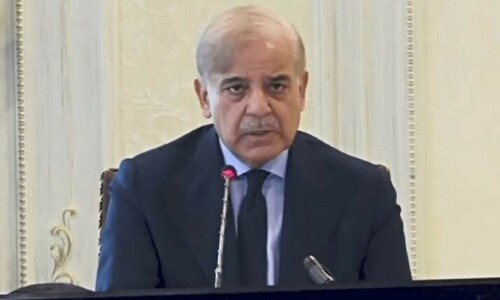HYDERABAD: Sindh Information Minister Saeed Ghani took a dig at Sindh opposition parties and argued that a majority party in assembly was supposed to do legislation and minority parties could only offer suggestions.
Alluding to Jamaat-i-Islami (JI), the Pakistan Peoples Party (PPP) leader said: “A party in the Sindh Assembly with only one member cannot impose its will on a party with 100 members”.
Speaking at a conference held here on Tuesday, the minister accused JI of fomenting ethnic violence and “toeing Muttahida Qaumi Movement-Pakistan’s (MQM-P’s) line”.
He questioned, “If a man from Mianwali can become the prime minister, then why can’t someone from Sehwan be Sindh’s chief minister?”
The minister said that Sindh government had introduced amendment to the Sindh Local Government Act 2013 with bona fide intention, and added that government was holding talks with political parties for their input.
He said the MQM-P, Grand Democratic Alliance (GDA) and Pakistan Tehreek-i-Insaf (PTI) had some reasons to oppose the new law, otherwise PPP was reaching the JI and Pak Sarzameen Party (PSP).
Giving a detailed background of LG system in Sindh to business community leaders and representatives of different political and religious parties, he said no new law was introduced, but only amendments were made.
He said the authority to collect property tax had been given to mayors, adding that police, health and education departments were made answerable to them. He said that population of central district had declined, whereas population in Karachi’s East, West and Malir districts had increased, consequently increasing constituencies in these districts.
Builder and developer Kashif Sheikh said that ethnic divide hampered growth in housing sector.
Kotri Association of Trade and Industry (KATI) ex-chairman Asif Memon pointed out that while PPP was demanding authority from federation, the party was ‘centralising’ affairs in Sindh.
Hyderabad Chamber of Small Trader and Small Industry Altaf Memon urged Sindh government to discuss the law with the opposition to find out some solution. He said business community was not aligned with any particular political party and nobody would encourage ethnic tendencies.
Jamiat-i-Ulema Pakistan-Noorani chief Sahibzada Abul Khair Zubair said that opposition parties should have been invited to the conference.
Sunni Tehreek leader Imran Soharwardi said that his party abhorred ethnic politics.
Aajiz Dhamrah read out a resolution that the conference supported the new amendments.
Published in Dawn, January 26th, 2022










































